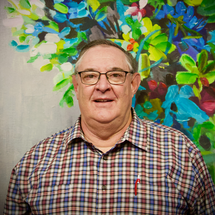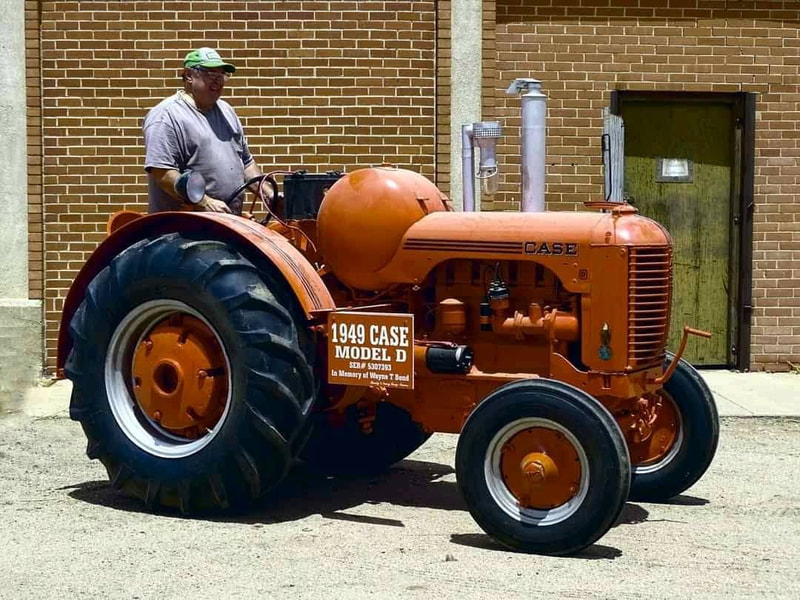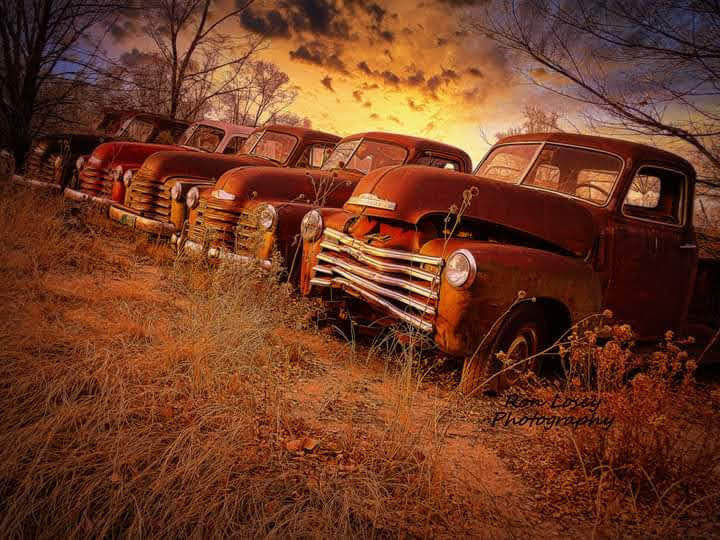
Coming a long way: Randy Losey logs miles for mental wellness
By Kelly Spieker
By Kelly Spieker
Randy Losey has spent the last decade-plus learning that mental health is health — and that it’s never too late to learn how to set boundaries and take care of yourself.
A 59-year-old from Las Animas, Randy commuted weekly to Colorado Springs this summer to complete Peer-to-Peer, NAMI’s no-cost, eight-session educational program that helps adults with mental health conditions better understand themselves and their recovery. He’s also participated in our Thursday night Connection Support Group for peers.
In mid-November, we talked with Randy about finding comfort in NAMI’s peer-led model of support and his drive to advocate not only for himself, but for others walking with mental health conditions.
We don’t always recognize that something is wrong with our mental health. Can you tell me about that time for you, and what made you decide to seek help?
Randy: I worked in Corrections a total of 16 years — at a private prison in Colorado from 1993 until June 2001, then at the state prison at Fort Lyon until June of 2008. I was what you’d call the captain of the physical plant. The last couple of years at Fort Lyon, [a supervisor] caused a lot of people issues and made my life a living hell.
I never knew I had an issue, and I didn’t realize how bad it was affecting me. I kept going to my family doctor and was trying different medications. It got so bad that on Sunday evenings, when I knew I had to work on Monday, I was becoming physically ill. My last two years at DOC, I was rushed to the hospital twice, with doctors thinking it was a heart attack or a leaky valve. Both times they said it was nothing but stress and told me if I didn’t leave [the DOC], I’d be dead within five years. I only worked a little while longer after that.
Can you tell me more about how you coped at first?
Randy: I’ve spent the last 14 years going to counselors and psychiatrists, and it took several years to get my medication to where I could function normally. After maxing out my credit cards on counselors and different therapies, I finally said to myself, “Something’s got to give.” I hit a real low and thought some terrible thoughts about my life. I was finally diagnosed with PTSD and depression in 2008.
How did you hear about NAMI?
Randy: I saw an 800 number on Facebook that said to call if you needed someone to listen, and over the last year I’ve called probably three times. The third time I called, I got a real caring guy who is the one that gave me NAMI’s phone number.
It was on a Thursday that I happened to call the [NAMI] office, and I just can’t thank that lady who answered the phone enough. She wanted to do whatever she could to get me whatever help I needed. She told me about the Connection Support Group that night.
I live in Las Animas, which is about 85 miles east of Pueblo and about 135 miles from Colorado Springs, but I went [to Connection] and it was a total game-changer for me.
What did you learn in Connection that helped you?
Randy: I was afraid to talk to anyone about what I was going through. It really helped to see how everyone has problems but opens up and shares. It helped to release some of that, instead of letting it fester and boil inside of me. I learned to not be afraid to talk about your issues, and that so many other people have issues.
What’s kept you coming back to NAMI for support?
Randy: I just don’t have enough praise and thanks for what NAMI has going on. You think your situation is worse and you don’t think that anyone else has these problems, but the peer-sharing and facilitators make you feel right at home the second you walk in.
Mental illness affects all walks of life, and I just felt like I fit in. There were so many people in that first group that they split us into two groups, and I ended up in Sarah’s group. [Sarah Banta is NAMI’s peer programs coordinator and a Connection facilitator.] She made me feel right at home, and that is where I needed to be.
How are you doing today?
Randy: I’m doing great. I’ve been to maybe one Thursday night [Connection] support group since graduating from Peer-to-Peer this summer. I don’t have anything triggering me. The world is full of people with mental illness that back in the day never got talked about. But now I know there’s help.
And finally, what is something interesting about you?
Randy: I’m very sentimental – I always have been — so I still have a lot of my childhood toys, and I’m a collector, hoarder kind of guy. I’ve driven to auctions in Canada, Montana, Kansas and Texas – I’ve hauled tractors hundreds of miles home. The television show “American Pickers” filmed at my place in July 2017, and that episode aired November 2019.
I’ve been on the local cemetery board of directors for 26 years, and before that I spent 10 years on the local nursing home board. I like to stay busy volunteering. I am a plumber by trade and like to do free work for churches or for seniors to give back to the community.
NAMI Colorado Springs can offer Peer-to-Peer and Connection Support Group at no cost because of the generosity of its donors. And with more than 80 volunteers helping us deliver programs, we do our best to keep costs low. If you can help support our classes and groups for people like Randy, please consider donating here.
A 59-year-old from Las Animas, Randy commuted weekly to Colorado Springs this summer to complete Peer-to-Peer, NAMI’s no-cost, eight-session educational program that helps adults with mental health conditions better understand themselves and their recovery. He’s also participated in our Thursday night Connection Support Group for peers.
In mid-November, we talked with Randy about finding comfort in NAMI’s peer-led model of support and his drive to advocate not only for himself, but for others walking with mental health conditions.
We don’t always recognize that something is wrong with our mental health. Can you tell me about that time for you, and what made you decide to seek help?
Randy: I worked in Corrections a total of 16 years — at a private prison in Colorado from 1993 until June 2001, then at the state prison at Fort Lyon until June of 2008. I was what you’d call the captain of the physical plant. The last couple of years at Fort Lyon, [a supervisor] caused a lot of people issues and made my life a living hell.
I never knew I had an issue, and I didn’t realize how bad it was affecting me. I kept going to my family doctor and was trying different medications. It got so bad that on Sunday evenings, when I knew I had to work on Monday, I was becoming physically ill. My last two years at DOC, I was rushed to the hospital twice, with doctors thinking it was a heart attack or a leaky valve. Both times they said it was nothing but stress and told me if I didn’t leave [the DOC], I’d be dead within five years. I only worked a little while longer after that.
Can you tell me more about how you coped at first?
Randy: I’ve spent the last 14 years going to counselors and psychiatrists, and it took several years to get my medication to where I could function normally. After maxing out my credit cards on counselors and different therapies, I finally said to myself, “Something’s got to give.” I hit a real low and thought some terrible thoughts about my life. I was finally diagnosed with PTSD and depression in 2008.
How did you hear about NAMI?
Randy: I saw an 800 number on Facebook that said to call if you needed someone to listen, and over the last year I’ve called probably three times. The third time I called, I got a real caring guy who is the one that gave me NAMI’s phone number.
It was on a Thursday that I happened to call the [NAMI] office, and I just can’t thank that lady who answered the phone enough. She wanted to do whatever she could to get me whatever help I needed. She told me about the Connection Support Group that night.
I live in Las Animas, which is about 85 miles east of Pueblo and about 135 miles from Colorado Springs, but I went [to Connection] and it was a total game-changer for me.
What did you learn in Connection that helped you?
Randy: I was afraid to talk to anyone about what I was going through. It really helped to see how everyone has problems but opens up and shares. It helped to release some of that, instead of letting it fester and boil inside of me. I learned to not be afraid to talk about your issues, and that so many other people have issues.
What’s kept you coming back to NAMI for support?
Randy: I just don’t have enough praise and thanks for what NAMI has going on. You think your situation is worse and you don’t think that anyone else has these problems, but the peer-sharing and facilitators make you feel right at home the second you walk in.
Mental illness affects all walks of life, and I just felt like I fit in. There were so many people in that first group that they split us into two groups, and I ended up in Sarah’s group. [Sarah Banta is NAMI’s peer programs coordinator and a Connection facilitator.] She made me feel right at home, and that is where I needed to be.
How are you doing today?
Randy: I’m doing great. I’ve been to maybe one Thursday night [Connection] support group since graduating from Peer-to-Peer this summer. I don’t have anything triggering me. The world is full of people with mental illness that back in the day never got talked about. But now I know there’s help.
And finally, what is something interesting about you?
Randy: I’m very sentimental – I always have been — so I still have a lot of my childhood toys, and I’m a collector, hoarder kind of guy. I’ve driven to auctions in Canada, Montana, Kansas and Texas – I’ve hauled tractors hundreds of miles home. The television show “American Pickers” filmed at my place in July 2017, and that episode aired November 2019.
I’ve been on the local cemetery board of directors for 26 years, and before that I spent 10 years on the local nursing home board. I like to stay busy volunteering. I am a plumber by trade and like to do free work for churches or for seniors to give back to the community.
NAMI Colorado Springs can offer Peer-to-Peer and Connection Support Group at no cost because of the generosity of its donors. And with more than 80 volunteers helping us deliver programs, we do our best to keep costs low. If you can help support our classes and groups for people like Randy, please consider donating here.
Photos below include tractors, cars and other items from Randy's antique collection. The bottom left photo is of him and the guys from American Pickers!






